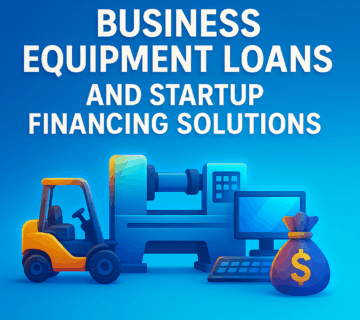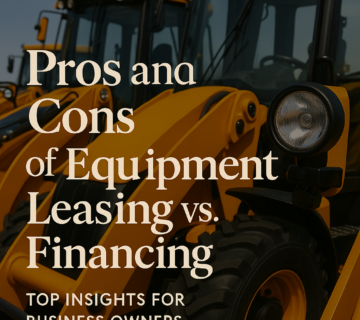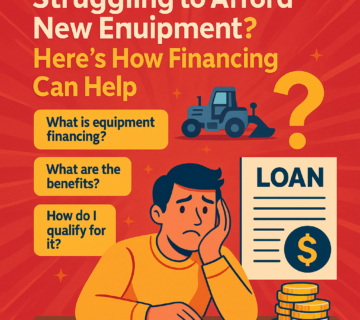Leasing vs. Financing: What’s Best for You?

When it comes to acquiring equipment for your business, you have two main options: leasing or financing. Both systems have their own advantages and disadvantages. Choosing between the two depends on your business needs, cash flow, and long-term plans. In this blog, we’ll explore equipment financing and leasing, comparing both options to help you make the right decision.
What Is Equipment Financing?
Equipment financing is a loan specifically used to buy machinery or other business-related items. It allows businesses to spread out the cost of expensive equipment over time rather than paying for it all at once. This can be an excellent choice if you need to own the equipment outright for long-term use.
When working with an equipment finance company, businesses get access to a loan or line of credit. The borrowed amount is repaid over a set term with interest, just like any other business loan. But the key advantage is that the equipment itself serves as collateral, making it easier for small businesses to secure financing.
How Does Equipment Leasing Work?
Leasing is an arrangement where a business rents equipment for a specific time period instead of buying it. At the end of the lease, you may have the option to purchase the equipment at a reduced price, renew the lease, or return the equipment altogether.
Leasing is often considered a better option if you don’t need permanent ownership of the equipment. It’s also a great choice for equipment that gets outdated quickly or for businesses that need to preserve cash flow.
Benefits of Equipment Financing
- Ownership: One of the main benefits of equipment loans for small business is that you own the asset once the loan is repaid. Unlike leasing, where you return the equipment, financing allows you to retain the machinery.
- Tax Deductions: Often, businesses can deduct depreciation and interest payments on financed equipment, providing significant tax benefits.
- Building Equity: Over time, the equipment becomes an asset on your balance sheet, which may improve your financial standing.
- Flexibility: You can choose repayment terms that fit your budget and business cash flow.
Benefits of Equipment Leasing
- Lower Upfront Costs: Leasing often has a lower initial cost compared to purchasing equipment with a loan. There are no hefty down payments required, which can be ideal for businesses with limited capital.
- Easier Upgrades: For industries that rely on technology or specialized equipment, leasing allows businesses to upgrade more easily. Once the lease term ends, you can replace outdated machinery with newer models.
- Predictable Expenses: Lease payments are fixed, making budgeting and cash flow management simpler.
- No Maintenance Concerns: In some lease agreements, the leasing company takes care of equipment maintenance, saving you both time and money.
Which Is Best for Small Businesses?
For many small businesses, deciding between equipment loans for small business and leasing depends on how long they plan to use the equipment. If your business relies on using the same equipment for a long period, purchasing through financing might be the best option.
On the other hand, if you need the latest equipment but can’t afford the high upfront costs, leasing may be a smarter move.
Key Differences Between Equipment Leasing and Financing
- Ownership: With equipment leasing, you don’t own the equipment unless you choose to buy it at the end of the lease. Financing, on the other hand, means you own the equipment once the loan is fully repaid.
- Upfront Costs: Leasing typically involves lower upfront costs compared to financing, which may require a down payment.
- Upgrade Options: Leasing allows for easier upgrades at the end of the lease term, especially in industries where technology evolves quickly. Financing doesn’t offer such flexibility, as you own the equipment and need to handle upgrades separately.
- Tax benefits: Lease payments are typically tax deductible as a business expense. For financing, businesses can deduct depreciation and interest from their taxes.
- Repairs and Maintenance: In some leasing agreements, the lessor covers maintenance, while with financed equipment, the business is responsible for upkeep.
How to Choose the Right Equipment Finance Company
When looking for an equipment finance company, consider several factors:
- Reputation: Check reviews and testimonials to ensure you’re working with a trusted lender.
- Interest Rates: Compare rates across different companies to get the best deal.
- Flexibility in Terms: Look for lenders that offer flexible payment terms to match your business cash flow.
- Customer Service: Ensure the company offers excellent support throughout the loan process.
An equipment finance company should work with you to tailor financing solutions that meet your business’s specific needs.
FAQs About Leasing and Financing Equipment
1. Is leasing cheaper than financing equipment?
It depends. Leasing has lower upfront costs, but you won’t own the equipment unless you choose to buy it at the end. Financing might cost more initially but gives you full ownership.
2. Can I deduct lease payments from my taxes?
Yes, in most cases, lease payments are fully deductible as business expenses. However, consult a tax professional to understand how it applies to your specific situation.
3. What happens if I default on an equipment loan?
Since the equipment is used as collateral, the lender can seize the equipment if you default on the loan. This makes it easier to qualify for an equipment loan but riskier if you can’t make payments.
4. Can I finance used equipment?
Yes, many lenders allow businesses to finance used equipment. Be sure to check with the equipment finance company about their policies.
5. Is it possible to lease equipment with poor credit?
Leasing companies may be more lenient than lenders when it comes to credit scores. However, you may still face higher rates or stricter terms if you have poor credit.
6. What type of businesses should consider leasing?
Businesses that need to frequently upgrade their equipment, such as tech firms or manufacturing companies, may find leasing to be more beneficial.
Final Thoughts: Leasing vs. Financing Equipment
The decision between leasing and financing comes down to your business needs and long-term plans. If owning the equipment makes more sense for your company, an equipment loan for small business might be the best path. However, if you need flexibility and low upfront costs, leasing could be the better option.
Regardless of your choice, it’s essential to work with a reputable equipment finance company that understands your needs and provides the best terms for your situation.




No comment